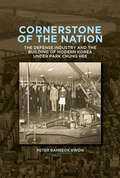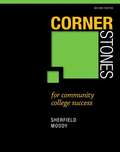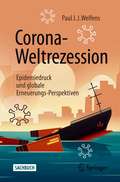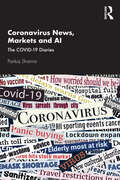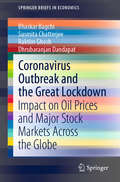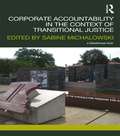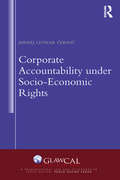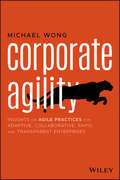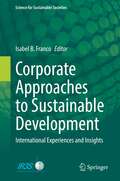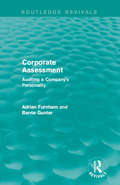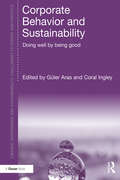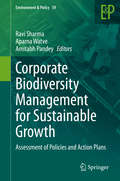- Table View
- List View
Cornerstone of the Nation: The Defense Industry and the Building of Modern Korea under Park Chung Hee (Harvard East Asian Monographs)
by Peter Banseok KwonCornerstone of the Nation is the first historical account of the complex alliance of military and civilian forces that catapulted South Korea’s conjoined militarization and industrialization under Park Chung Hee (1961–1979). Kwon reveals how Park’s secret program to build an independent defense industry spurred a total mobilization of business, science, labor, and citizenry, all of which converged in military-civilian forces that propelled an unprecedented model of modernization in Korea. Drawing on largely untapped declassified materials from Korea and personal interviews with contemporaneous participants in the nascent defense industry, as well as declassified US documents and other external sources, Kwon weaves together oral histories and documentary evidence in an empirically rich narrative that details how militarization shaped the nation’s rapid economic, technological, political, and social transformation. Cornerstone of the Nation makes the case that South Korea’s arms development under Park may be the most durable and yet least acknowledged factor behind the country’s rise to economic prominence in the late twentieth century. Through an analysis that simultaneously engages some of the most contested issues in Korean historiography, development literature, contemporary politics, and military affairs, this book traces Korea’s distinct pathway to becoming a global economic force.
Cornerstones for Community College Success (Second Edition)
by Robert M. Sherfield Patricia G. MoodyFor First Year Experience, Student Success, and Introduction to College courses. Written specifically for students attending two year programs, it addresses the needs and challenges of students in community and technical colleges. Cornerstones for Community College Success is known for its concrete and practical strategies that students can apply to all college classes, the world of work, and life in general, it addresses the "why" of learning and the power of positive change. Offers hallmark coverage of Bloom's taxonomy, SQ3R integration, Information and Financial literacy. Major defining topics include first generation students, adult learners, making successful transitions, and planning for success in the second year and beyond. The ancillary materials are designed to assist instructors in delivering a top-level student success course.
Corning Glass Works International (A)
by Michael Y. Yoshino Christopher A. BartlettFollows the impact of a change in global strategy on a diversified company's global organization structure. Traces two failed attempts at bringing a business perspective to a geographic organization, and poses the problem of what the international division president can do.
Corning Glass Works: The Electronic Products Division (A)
by Michael BeerDescribes a division of Corning Glass Works that finds itself with deep financial and organizational problems. Severe conflict and lack of coordination exist between functional groups. Employees do not have a sense of direction and morale is low. Provides sufficient data to determine that the cause of these problems is a change in business environment that had been followed by change in organization and management. Can be used for analysis of organization-environment relationships and action planning for change and environment.
Corning Glass Works: The Electronic Products Division (A)
by Michael BeerDescribes a division of Corning Glass Works that finds itself with deep financial and organizational problems. Severe conflict and lack of coordination exist between functional groups. Employees do not have a sense of direction and morale is low. Provides sufficient data to determine that the cause of these problems is a change in business environment that had been followed by change in organization and management. Can be used for analysis of organization-environment relationships and action planning for change and environment.
Corning Glass Works: The Z-Glass Project
by Kim B. ClarkConsiders decisions facing the leader of a manufacturing staff project team assigned to a plant where yields have deteriorated sharply. The process is complex: the plant organization is not cooperative and there are deep disagreements about what is wrong and how to fix it. Provides an opportunity to analyze yields and productivity, as well as the organizational and personal challenges inherent in line-staff interaction.
Corning, Inc.: A Network of Alliances
by Ashish Nanda Christopher A. BartlettDescribes James Houghton's actions in assuming the role of CEO at Corning in the midst of a recession. Not only must he turn around operating performance, he must also revitalize a demoralized organization and set a new, clear strategic direction. In doing so, the case focuses on the changing role of alliances and partnerships in Corning operations. Increasingly, they are moving from a peripheral role in providing market access interchange for technology, to a more central role at the core of Corning's business. The strategic and organizational challenges this presents are highlighted through some specific decision issues facing Houghton.
Corning, Inc.: Technology Strategy in 2003
by Rebecca HendersonCorning, Inc. has a 150-year history of building a strategy around innovation. Founded as a glass manufacturer in 1851, the company quickly established itself as a maker of specialty glass products and over the next 100 years diversified into light bulbs, television, cookware, silicones, medical products, and, finally, optical fiber. As the telecommunications industry boomed in the late 1990s, the optical fiber business boomed with it, and Corning's stock hit record highs. The firm made more than $9 billion worth of acquisitions in fiber and photonics (acquiring more than $6 billion worth of goodwill in the process) before the crash hit. Corning's stock collapsed, and in 2002 the company faced serious operating challenges. Designed to be used as an opening case in a course on technology strategy. Outlines the history of innovation at Corning, stressing the company's history of "patient money" and long-term commitment to technology. Briefly summarizes the firm's recent history and then the challenge that faces the firm's chief technology officer in seeking to justify spending on research and development.
Corning: 156 Years of Innovation
by H. Kent Bowen Courtney PurringtonThe executive team at Corning has committed to double the rate of new business creation per decade, while at the same time growing the company's current businesses, including glass substrates for LCD displays. Their strategy, built on more than 150 years of successful innovation, is to invent "keystone components" which uniquely enable other companies' products and earn high margins from its proprietary technology. As part of the company's mission to be around for another 150 years, the executive team is also committed to devote considerable resources to basic research "in faith" that it will create new, high-margin businesses that will drive corporate growth in 10-20 years and enable the company to "reinvent" itself, even though they will not be around to reap the benefits of this investment. The executive team must choose how to allocate finite RD&E resources between (1) "pushing" one, or more, of four brand new businesses with considerable potential in the development pipeline to the market sooner; (2) allocating more resources to six new products being launched from existing businesses; or (3) spending more on exploratory research. In making these decisions, the executive team must consider the impact of their decision on not only near-term earnings, but on how it will enable Corning to diversify over the medium to long term in terms of the quality and quantity of its portfolio of new technologies in the development pipeline and new businesses being launched, especially so that it is not overly dependent on sales of a particular business like LCD glass.
Cornwall, Its Mines and Miners
by J. R. LeifchildPublished in the year 1968, Cornwall, Its Mines and Miners is a valuable contribution to the field of Economics.
Corona Beer
by Rohit DeshpandeIn early June 1997, the CEO and vice chairman of Grupo Modelo were reviewing the performance of Corona beer in the U.S. market. Despite a much higher sales volume growth rate, Corona still trailed Heineken, the #1 imported beer brand in the U.S. market. Could Corona overtake Heineken and, if so, what marketing strategy changes needed to be made? Includes color exhibits.
Corona verändert ein Land: Neue Wege für Wirtschaft und Gesellschaft
by Horst-Udo Niedenhoff Peter OrthDieses Buch ist eine Chronik und Bestandsaufnahme der Corona-Pandemie in Deutschland von ihren Anfängen bis heute (April 2023).Die durch das Virus verursachte Krise offenbart schlaglichtartig die strukturellen Schwächen unseres Landes: Ein verordnungsorientierter Staatsapparat, ein antiquiertes Bildungssystems und ein eher träges Wirtschaftssystem behindern angemessene Reaktionen, weitere Entwicklung und höhere Wettbewerbsfähigkeit. Eine Bildungs- und Weiterbildungsoffensive und eine Digitalisierungsoffensive sind die wichtigsten Konsequenzen, die nun gezogen werden müssen.Das Buch bietet dazu Analysen und Gewichtungen positiver und negativer Entwicklungen auch anhand tabellarischer Darstellungen und formuliert schließlich Handlungshinweise für verschiedene Gesellschafts- und Wirtschaftsbereiche. Es richtet sich an Führungskräfte der Wirtschaft, deren Mitarbeiter und Begleiter in den Aufsichts- und Mitbestimmungsorganen, an die Gestalter von Bildung und Weiterbildung sowie an das politische Personal unseres Landes. Für die 2. Auflage wurde ein ausführliches Kapitel über die Auswirkungen der Pandemie auf den Kulturbetrieb ergänzt.
Corona, Climate, Chronic Emergency: War Communism in the Twenty-First Century
by Andreas MalmWhat does the COVID 19 tell us about the climate breakdown, and what should we do about it?The economic and social impact of the coronavirus pandemic has been unprecedented. Governments have spoken of being at war and find themselves forced to seek new powers in order to maintain social order and prevent the spread of the virus. This is often exercised with the notion that we will return to normal as soon as we can. What if that is not possible? Secondly, if the state can mobilize itself in the face of an invisible foe like this pandemic, it should also be able to confront visible dangers such as climate destruction with equal force. In Corona, Climate, Chronic Emergency, leading environmental thinker, Andreas Malm demands that this war-footing state should be applied on a permanent basis to the ongoing climate front line. He offers proposals on how the climate movement should use this present emergency to make that case. There can be no excuse for inaction any longer.
Corona-Weltrezession: Epidemiedruck und globale Erneuerungs-Perspektiven
by Paul J.J. WelfensDieses Buch bietet eine umfassende Analyse der Corona-Weltrezession und zeigt erstmals auf, wie stark verändert die Weltwirtschaft durch die Corona-Schocks sein wird. Die Europäische Union muss – wie die USA und China – mit dem Corona-Schock mehrere Stress-Tests bestehen: medizinisch, ökonomisch, wirtschaftspolitisch. Gründe für die Sterbequoten werden identifiziert. Die Corona-Schocks bringen politische Enttäuschung über die Seuchenpolitik, z.T. eine Abkehr von der Demokratie. Dabei gibt es in der EU noch das Risiko #Eurokrise2 und Druck zu digitalem Strukturwandel sowie verstärkter Klimapolitik: mit mehr Einkommensungleichheit. Corona-Probleme in den USA sollten zu Gesundheitssystem-Reformen führen, während Deutschland und Österreich fürs Erste die Herausforderung gemeistert haben. Die Corona-Epidemie wird politische Narben hinterlassen. Der EU-Gipfel im Juli 2020 steht für widersprüchliche Politik. Der Westen fällt gegenüber Asien zurück.
Coronavirus News, Markets and AI: The COVID-19 Diaries
by Pankaj SharmaCoronavirus News, Markets and AI explores the analysis of unstructured data from coronavirus related news and the underlying sentiment during its real-time impact on the world and on global financial markets, in particular. In an age where information, both real and fake, travels in the blink of an eye and significantly alters market sentiment daily, this book is a blow by blow account of economic impact of the COVID-19 pandemic. The volume: Details how AI driven machines capture, analyse and score relevant on-ground news sentiment to analyse the dynamics of market sentiment, how markets react to good or bad news across ‘short term’ and ‘long term’; Investigates what have been the most prevalent news sentiment during the pandemic, and its linkages to crude oil prices, high profile cases, impact of local news, and even the impact of Trump’s policies; Discusses the impact on what people think and discuss, how the COVID-19 crisis differs from the Global Financial Crisis of 2008, the unprecedented disruptions in supply chains and our daily lives; Showcases how easy accessibility to big data methods, cloud computing, and computational methods and the universal applicability of these tool to any topic can help analyse extract the related news sentiment in allied fields. Accessible, nuanced and insightful, this book will be invaluable for business professionals, bankers, media professionals, traders, investors, and investment consultants. It will also be of great interest to scholars and researchers of economics, commerce, science and technology studies, computer science, media and culture studies, public policy and digital humanities.
Coronavirus Outbreak and the Great Lockdown: Impact on Oil Prices and Major Stock Markets Across the Globe (SpringerBriefs in Economics)
by Bhaskar Bagchi Dhrubaranjan Dandapat Susmita Chatterjee Raktim GhoshThis book captures the dynamic relationship between COVID-19 pandemic, crude oil prices and major stock indices as well as the crude oil prices and stock market volatility that have been caused due to outbreak of this pandemic. The pandemic has changed the world melodramatically and major world markets collapsed in the beginning, affecting major industries in an unprecedented way. The book will be useful to the researcher in the field of finance and economics, and policy makers both at government and private level, keeping in view the present state of economy throughout the world.
Corporate Accountability in the Context of Transitional Justice
by Sabine MichalowskiCorporate Accountability in the Context of Transitional Justice explores how corporations can be held accountable for their role in past human rights violations when a country is making a transition from conflict or repression to peace and democracy. It breaks new ground in theorizing the linkages between the areas of transitional justice and corporate accountability and analyzing problems frequently arising where the two fields meet in practice, for example where the role of corporations in past human rights violations is examined by truth and reconciliation commissions or in the course of litigation. The book provides an overview of the current trends in law and in legal and political discussion relating to both areas, as well as in-depth analysis of how tools of corporate accountability and transitional justice can complement each other in order to achieve the best outcomes for bringing justice to victims and lasting peace to societies. The authors bring extensive experience from diverse professional backgrounds and jurisdictions to provide the first sustained attempt to address this link. The book will be of interest to scholars, practitioners, policymakers and activists working in the areas of transitional justice; corporate accountability; and business and human rights.
Corporate Accountability under Socio-Economic Rights (Transnational Law and Governance)
by Jernej Letnar ČerničIn recent decades, corporations have increasingly accepted that they have obligations to respect the socio-economic rights of individuals whose rights to livelihoods, education, food, health, housing and water are affected by the actions of corporations on a daily basis. Despite this, it is often difficult for victims to bring corporations to court for violations of their socio-economic rights. Domestic constitutional systems provide, at best, fragile and limited protections against adverse corporate activities, while international responses have been lacking in creating obligations and accountability for corporations under socio-economic rights. The urgency of bolstering corporate accountability for socio-economic rights is therefore apparent. In light of this, this book asks whether corporations are required to observe socio-economic rights and if they are accountable for any violations. In doing so, it identifies and analyzes the theoretical foundations and the existing scope of corporate accountability arising from socio-economic rights at both national and international levels. Through careful analysis, Jernej Letnar Černič exposes the stark need for greater clarity in the obligations and accountability of corporations, advocating a normative framework for corporate accountability for socio-economic rights in national legal orders which builds on existing mechanisms.
Corporate Advantage: Identifying and Exploiting Resources
by David J. CollisDescribes the economic theory that was behind the view that resources are central to the creation of value in multibusiness corporations and identifies tests that resources must pass to become part of a firm's "distinctive competence". Describes how those resources can be leveraged, built, or altered.
Corporate Advantage: Identifying and Exploiting Resources
by David J. CollisDescribes the economic theory that was behind the view that resources are central to the creation of value in multibusiness corporations and identifies tests that resources must pass to become part of a firm's "distinctive competence". Describes how those resources can be leveraged, built, or altered.
Corporate Agility: Insights on Agile Practices for Adaptive, Collaborative, Rapid, and Transparent Enterprises
by Michael WongIntegrate Agile methodology into your business with this stunning guide to the latest management techniques Corporate Agility is the must-have guide on adopting Agile methodology for businesses of all shapes and sizes. This visually stunning book delivers seven key lessons that you must learn in order to effectively join the Agile world. You'll learn the ins and outs of the traditional approach, helping you answer the questions "Why Agile?" and "Why now?" You'll also discover new, more efficient Agile strategies that will help you lead your enterprise to increased collaboration, more flexibility, and better business results. Based on the latest practice and research, and drawing on years of experience at the author's own leading consultancy, Corporate Agility features a beautiful 4-color design that helps you visualize powerful strategic ideas, so you can understand and implement them right away. Unlike other books on the market, this title helps you reinterpret key Agile management concepts in a way that will work for your specific needs. Gain a clear understanding of traditional Agile methodology, the history of Agile, and the benefits to organizations of all shapes and sizes Discover cutting-edge Agile strategies that push Agile thinking forward and increase performance efficiency Learn the 7 "Agilessons" that underpin all successful Agile transformations Follow real-world case studies from leading businesses that have successfully made the leap into Agile operations Organizational leaders will love this digestible, forward-thinking guide written by one of America's fastest rising strategic execution gurus.
Corporate Approaches to Sustainable Development: International Experiences and Insights (Science for Sustainable Societies)
by Isabel B. FrancoThis book aims to answer the question: how can the industry action international approaches to corporate sustainability, ultimately achieving sustainable development and overall sustainability? With this question in mind, this manuscript examines how the industry, through existing approaches to corporate sustainability, contribute to addressing conflicting demands emerging from the achievement of sustainable development in a responsible, sustainable and innovative manner. It also reviews alternative models of corporate sustainability that contribute to achieving inclusive, sustainable development globally. Chapters 2 to 4 discuss emerging approaches to corporate sustainability. Chapters 5 to 11 examine the role that the extractive industry (mining and oil) could play in the delivery of sustainable solutions for the communities and environment in selected cases, in the Americas and Africa. Lastly, the manuscript showcases international corporate sustainability and climate change practices in the forestry, agriculture, tourism and manufacturing industries within the context of Asia and The Pacific region, particularly, Nepal and Bangladesh.
Corporate Assessment: Auditing a Company's Personality (Routledge Revivals)
by Adrian Furnham Barrie GunterCorporate Assessment, first published in 1993, looks at four types of company audit and provides a pragmatic, readable guide for managers. The authors show how assessment of a company in terms of its culture, climate, communications and customers can enhance management vision and lead to recommendations designed to improve employee satisfaction, motivation, loyalty and performance. Insight is provided into the kinds of measurement tools and assessment techniques that are available, and the authors offer recommendations for the use of these instruments, and how best to utilize the information they can produce. This book will not only be of interest to managers who need to assess their companies, but to students of business, organizational psychology, and human resource management.
Corporate Behavior and Sustainability: Doing Well by Being Good (Finance, Governance and Sustainability)
by Güler Aras Coral IngleyCompanies can no longer expect to engage in dubious or unethical corporate behaviour without risking their reputation and damaging, perhaps irrevocably, their market position. Irresponsible corporate behavior not only deprives shareholders of long-term returns but also ultimately imposes a cost on society as a whole. Sustainable business is about ensuring that entities contribute toward positive social, environmental, and economic outcomes. Bad business behaviour is costly for stakeholders, for markets, for society, and the economy alike. To ensure that a company behaves well, the buy-in of the leadership team is crucial. The full commitment of the board of directors, in conjunction with the senior managers of the organization, is required if an organization is to be socially responsible. In this sense, leadership does not reside with an individual (the CEO) within the organization but with all of those at the apex of corporate power and control. Effective change management requires enlightened and capable leadership to instigate and drive the process of embedding a sustainable and socially responsible corporate philosophy and culture that supports good business decision-making. A profound understanding of the requirements of such a leadership process will help corporate managers become highly effective change agents. Governance will be the main driver of this change. For the economy and financial markets to become sustainable and resilient, radical changes in corporate leadership need to take place. Integrated reporting, government regulation, and international standards will all be important factors in bringing about this change. As well as understanding the effects of corporate behavior on financial markets, such an understanding is also now imperative in relation to the social and environmental contexts.
Corporate Biodiversity Management for Sustainable Growth: Assessment of Policies and Action Plans (Environment & Policy #59)
by Amitabh Pandey Ravi Sharma Aparna WatveThis book aims to cover the multitude of corporate approaches towards mainstreaming biodiversity conservation and ecological management in policies and action plans, and explores the roles of these efforts in achieving national and global targets for the Sustainable Development Goals (SDGs). The book addresses various aspects of corporate actions such as corporate environmental responsibility, green businesses, market-based approaches to biodiversity conservation, and biodiversity trade-offs, and includes concept papers, reviews, and case studies presenting qualitative and quantitative research. Additionally, the text compares and assesses examples of positive and negative impacts of corporate involvement in biodiversity conservation in developed and developing countries to identify innovative approaches, and the best practices and models that can be replicated in diverse environmental conditions. The studies included in the book will help those working in the field of corporate involvement in biodiversity conservation, and outline the strengths and weaknesses of the approaches which will be useful for designing new environmental management action plans in the face of climate change. The book will also be of great value to researchers, academicians, policy makers, civil society groups, policy think tanks, and conservation managers.
